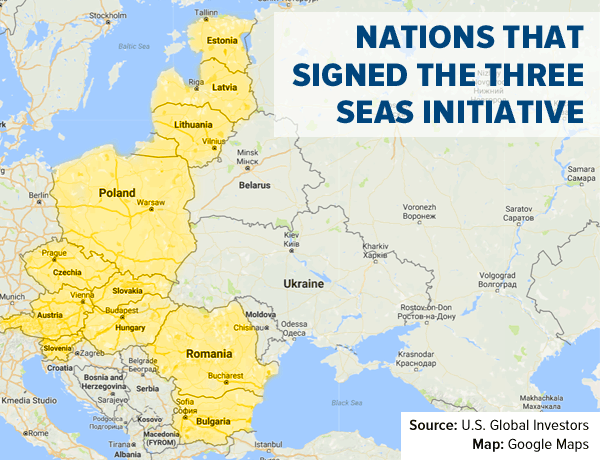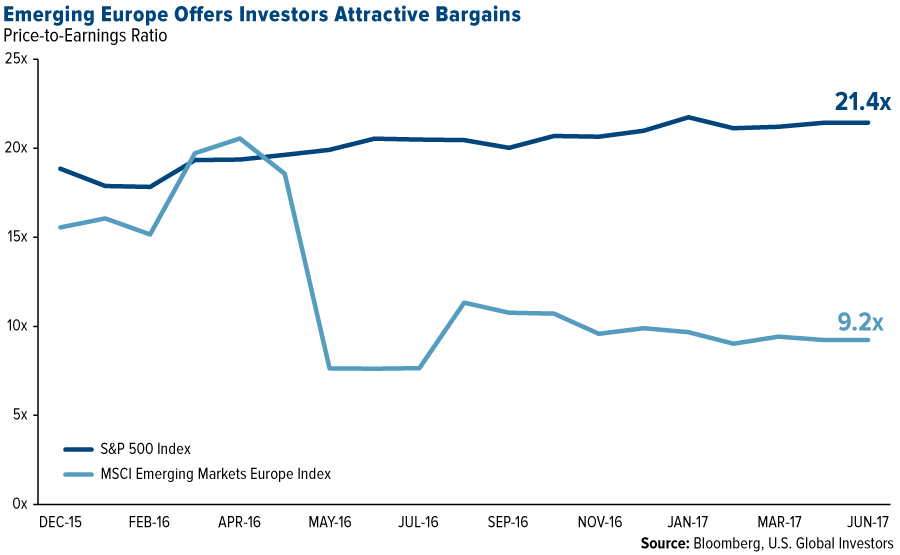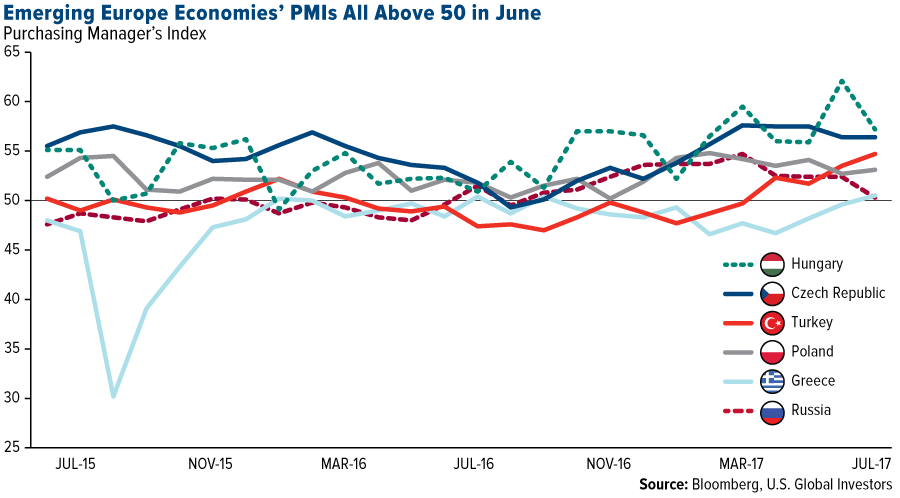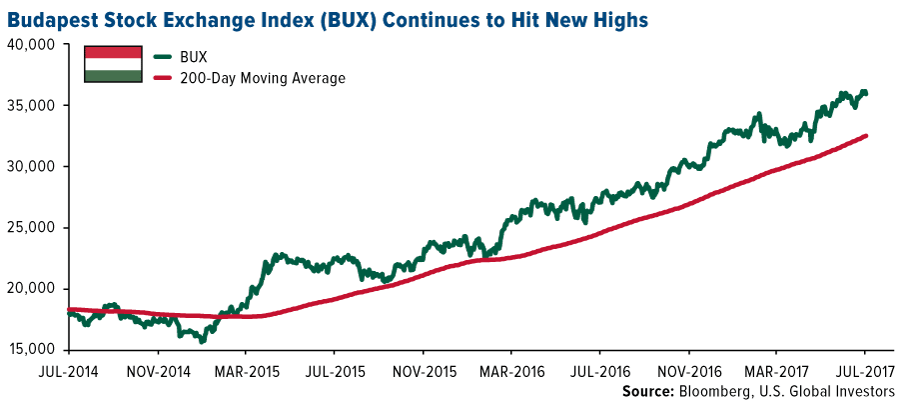American equities have been a good place to invest during the current bull market, now in its eighth year. Since the November election, the S&P 500 Index has surged close to 16 percent. But this means that valuations continue to creep up, and political risk threatens to derail further gains as President Donald Trump’s high-growth agenda stumbles on even more roadblocks.
Investors might therefore be looking for an alternative. I believe one of the most attractive destinations for your investment dollars right now is emerging European countries. Below you can see a valuation comparison between U.S. and emerging European equities. Trading at 9.2 times earnings, the latter are offering quite a bargain for investors seeking a “better bang for the buck.”
More than that, though, “core” Central and Eastern Europe (CEE) countries – including Poland, the Czech Republic, Romania and Hungary – are currently among the fastest growing in the world. In a recent series on the region, the Financial Times put it succinctly: “The former communist countries that have joined the European Union (EU) since 2004 offer superior growth to western Europe and many other emerging markets, combined with the benefits and protections of EU membership.”
Expectations for economic growth in CEE countries have changed rapidly and positively. The consensus forecast is now 2.5 percent growth this year, 0.3 percent points higher than expectations near the beginning of the year.
Next year could be even brighter, with analysts expecting 2.6 percent growth, 0.1 percentage point higher than earlier forecasts. Stronger-than-expected external demand in Western Europe, a tighter labor market, an attractive environment for foreign investment, government stimulus measures, easy financing conditions and the revival of EU structural funds are all supporting stronger growth in the region.
Manufacturing Continues To Strengthen
Loyal readers of Frank Talk know that we closely follow the purchasing manager’s index (PMI), which measures the strength of a country’s manufacturing industry. We’ve found it to be not only a handy gauge of future commodities demand but also a country’s or region’s economic growth potential.
For the first time in recent memory, most emerging European economies’ PMIs are above the key 50 mark that separates growth from contraction. Greece rose from 49.6 in May to 50.5 in June, the first time its manufacturing sector was in expansion mode in nearly a year.
Russia grew at a much slower pace in June, however, with its PMI falling to 50.3, just above the threshold. But as I shared with you this week, Capital Economics analysts believe Russian growth in the coming quarters “will be stronger than most anticipate,” with the Central Bank of Russia loosening monetary policy even further.
The fact that all CEE countries are above 50 points to synchronized growth. It also suggests that the worst of the region’s economic woes following the global recession might finally be in the rear-view mirror.
Poland: Next “Economic Powerhouse”?
Writing recently for the New York Times’ opinions section, Ruchier Sharma, Morgan Stanley (NYSE:MS) Investment Management’s chief global strategist, singled out Poland as the world’s likeliest next advanced economy, following South Korea’s entry into the high-income club 20 years ago.
I have to agree. As Sharma points out, Poland has seen average annual growth of 4 percent since 1991, the year it transitioned from communism to democracy. During that period, it hasn’t had a single down year, amazingly enough.
The Polish economy continued to grow at an annual rate of nearly 4 percent in the second quarter, as suggested by the May retail sales and industrial output data. According to mBank analysts, fiscal-year growth will slightly exceed 4 percent, driven by public investments recovery and persistently strong consumption. The real retail sales growth in the second quarter held close to the prior-quarter level, which means that consumption growth should remain at around 5 percent, mBank estimates.
Poland’s impressive ascent should only help strengthen other CEE countries, both economically and politically. Its president, Andrzej Duda, seems fully aware of this and has taken several important strides to improve not just Poland’s economy but the region’s as well. The Three Seas Initiative, spearheaded last year by Duda and Croatian president Kolinda Grabar-Kitarovi, seeks to connect the economies and infrastructure of 12 CEE countries between the Adriatic, Baltic and Black Seas. A number of EU officials see the Initiative as a threat to the EU bloc’s unity, which might be partially why President Trump agreed to meet with Initiative members when he visited Poland last month.

Stocks On The Rise
Also contributing to CEE growth right now is the steadily weakening U.S. dollar, as Reuters reports. Prague stocks rose to a seven-week high this week, while Hungary’s Budapest Stock Exchange Index (BUX) continues to hit new all-time highs.
Speaking of Hungary, its government is considering whether to lower personal income taxes to 10 percent from the current 15 percent. This would be a major boost to Hungarians’ disposable income, which is already rising at a breathtaking pace. Wage growth in April was an amazing 14.6 percent.
Again, the CEE region looks more and more like a good place to invest, not least of which because of its attractive discount to American equities.
The Vanguard FTSE Europe ETF (NYSE:VGK) was trading at $56.58 per share on Thursday morning, up $0.21 (+0.37%). Year-to-date, VGK has gained 20.34%, versus a 11.53% rise in the benchmark S&P 500 index during the same period.
VGK currently has an ETF Daily News SMART Grade of A (Strong Buy), and is ranked #2 of 89 ETFs in the European Equities ETF category.
Frank Holmes is the CEO and chief investment officer of U.S. Global Investors. Mr. Holmes purchased a controlling interest in U.S. Global Investors in 1989 and became the firm’s chief investment officer in 1999. In 2006, Mr. Holmes was selected mining fund manager of the year by the Mining Journal, and in 2011 he was named a U.S. Metals and Mining “TopGun” by Brendan Wood International. He is also the co-author of The Goldwatcher: Demystifying Gold Investing. More than 30,000 subscribers follow his weekly commentary in the award-winning Investor Alert newsletter which is read in over 180 countries.



